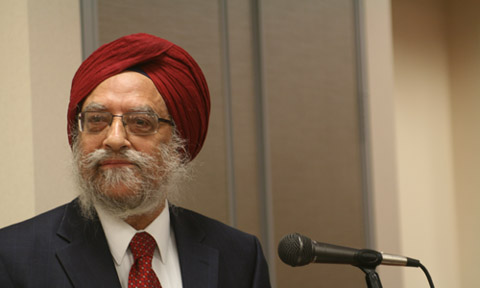Dr. Amritjit Singh,Langston Hughes Professor of English at Ohio University, gives the closing plenary on “Migration, Exile, and NonViolence: Through a Transnational Glass Darkly” at the International Conference on the Cultural Politics of Memory on May 16 in London.
The conference was hosted by the Centre for Critical and Cultural Theory at Cardiff University. The politics of remembering and forgetting are important social and cultural issues. The authority, power and resources with which to create hegemonic versions of the past – to give authoritative accounts that are available in the public domain – are largely the property of institutions. Questions of power, voice, representation and identity are central to Cultural and Collective Memory.
This interdisciplinary conference addresses how hegemonic narratives of the past are reproduced or challenged. It will examine the role of Cultural and Collective Memory in shaping meanings, values and identities. Papers are encouraged to address the relationship between past and present in Cultural and Collective Memory and how this relates to social power relations.
Abstract: In a January 2014 interview, graphic novelist Vishwajyoti Ghosh (This Side That Side: Restorying Partition, 2013), avers, “[W]e should do away with these myths that Partition is a 1947 thing. Partition is not only about the exodus but about the little Partitions that we carry in our heads.” This need for new genealogies to re-think Partition is signaled by what Vazira Zamindar calls “The Long Partition” – an examination of the “traces” (Gramsci) and legacies that shape the lives and attitudes of South Asians at home and in the diaspora. Similarly, in the U.S., race continues to haunt every aspect of culture and politics. Majoritarian discourses and official narratives of secularism, “communal” harmony, and colorblindness in the two locations have failed to engage the “minority psyche.” For example, African Americans in the U.S. and Muslims in India—roughly the same percentage of the total population— have historical memories and daily experiences that are quite distinct from those of most Euro-Americans in the U.S. and middle-class Hindu citizens of India respectively. Indeed, some of these memories exist in a network of affiliations that surface in ideas like “non-violence” that migrated from Mahatma Gandhi in colonized India to the Civil Rights movement under Martin Luther King, Jr., in the U.S. This is just one example of how anti-racist affiliations and projects are shaped by memory and its (re)formations that continue to involve a wide variety of situations and populations such as women, Dalits and Adivasis in India, as well as immigrants and other ethnic minorities in the U.S.
Considering this frame, the questions I seek to ask include the following: How do minority writers and other artists attempt to bridge this serious gap of experience and perception to foster more inclusive versions of community and nation? How do they navigate the traps of identity politics, lures of assimilation, and the ambivalence of memory in their fictional and life narrative responses? How might the transnation signal not just the mobility of bodies across borders, but also the ideas and alternative systems of knowledge that migrate from one location to another?
I shall attempt to examine the cultural politics surrounding the “minority psyche” in a comparative, transnational framework in relation to two or three texts from among the following: Attia Hosain’s Sunlight in a Broken Column (1961), Bhisham Sahni’s Tamas (1974), Intizar Hussain’s Basti (1979), Meena Alexander’s Fault Lines (1993, 2003), John Okada’s No-No Boy (1957), Alice Walker’s Meridian (1976), and Charles Johnson’s Dreamer (1998).
About Amritjit Singh: Amritjit Singh, Langston Hughes Professor of English at Ohio University, has published well over a dozen books, including The Novels of the Harlem Renaissance (1976), India: An Anthology of Contemporary Writing (1983), The Magic Circle of Henry James (1989), Memory, Narrative and Identity (1994), Conversations with Ralph Ellison (1995), Memory and Cultural Politics (1996), Postcolonial Theory and the United States (2000), The Collected Writings of Wallace Thurman (2003), and Interviews with Edward W. Said (2004). In 2011, Weavers Press, San Francisco, published The Circle of Illusion, a volume of Punjabi poems by Gurcharan Rampuri translated by Singh with poet Judy Ray of Tucson, AZ.
Past President of MELUS (The Society for the Study of MultiEthnic Literature of the United States), SALA (South Asian Literary Association), and USACLALS (Association for Commonwealth Literature and Language Studies), he currently serves as an Associate Editor of South Asian Review. An internationally known literary critic and scholar, Singh has lectured and/or taught in many countries in Asia, Africa, and Europe. In 2002, Singh was a Senior Fulbright Professor at the JFK Institute of North American Studies, Free University, Berlin. He also served as the Fulbright Senior Specialist in American Studies at the University of Graz, Austria (OctoberNovember 2007) and at the University of Alexandria in Egypt (FebruaryMarch 2010). In 2007, he received the Lifetime Achievement Award from MELUS, and in January 2014, SALA honored him with a Distinguished Achievement Award in South Asian Literary Scholarship.




















Comments